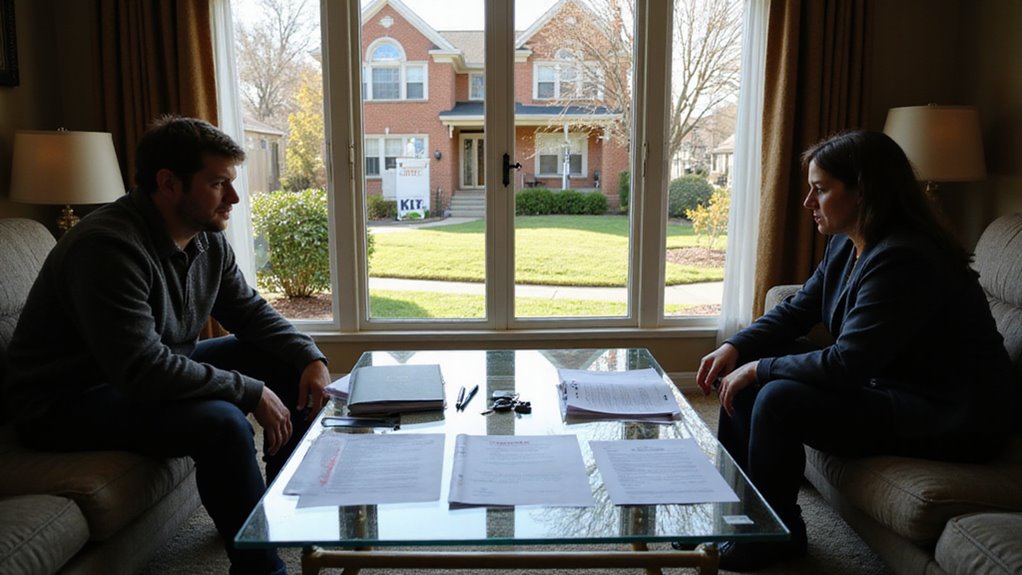Selling a House After Divorce in Cincinnati




Selling a house after a divorce in Cincinnati can feel overwhelming. You may face legal rules, emotional challenges, and market pressures. Both your finances and peace of mind are on the line.
The process often brings stress, disagreements, and tough choices. Many couples struggle to agree on money, timing, or who stays in the house.
These issues can delay the sale and drain your energy. The best way to sell a house after divorce in Cincinnati is to follow a clear plan and get expert help.
You can reach a fair deal, protect your interests, and move forward faster. Trusted advice will help you avoid costly mistakes. This blog explains each step and gives practical tips so you can sell your house after divorce with less stress.
Table of Contents
Understanding Property Division in Cincinnati Divorces

Property division in Cincinnati divorces follows the rule of equitable distribution. This means the court aims for a fair split, not always an equal one. Each spouse may not get half of everything. In Cincinnati divorces, property is divided fairly—not always equally—so each spouse may receive a different share.
A professional property appraisal can help determine your home’s true market value. If you want a fair outcome, you should get an accurate valuation. This step ensures both sides know what the property is really worth.
Emotional attachments to property can make decisions harder. If you let feelings guide you, you might not make the best financial choice. Try to focus on future financial stability instead of sentimental value.
If you approach property division with clear information, you can protect your interests. Weigh both the numbers and your feelings carefully. This will help you move forward with confidence after your Cincinnati divorce.
How to Navigate House Sales During Divorce
When selling a house during divorce, you need to follow Ohio’s legal requirements for property division and adhere to any court orders or agreements. Clarify each party’s ownership rights early to prevent delays or disputes. Establish a clear timeline so you can coordinate the sale efficiently and protect your interests.
Ohio law requires a fair division of property during divorce. The court uses equitable distribution, which means the split may not be equal. This rule covers your house in Cincinnati. A professional home appraisal is needed before selling your property. The appraisal gives a fair market value for both parties to use in negotiations. If you skip this step, you might face disputes.
Both you and your ex-spouse must pay any unpaid property taxes until the house sells. Ignoring tax obligations can delay the sale. Addressing taxes early helps avoid problems. If you follow these legal steps, you can protect your interests. Staying informed helps you move through property division more smoothly. Proper planning also helps prevent conflicts.
Court Orders and Agreements
Determining Home Ownership Rights
Timeline Considerations
Court orders and agreements control the sale of your house during a divorce in Ohio. These documents explain when and how the house must be sold. They also state who manages the sale and how money will be split.
You should always read court orders or agreements before making decisions. If you do not follow them, your sale may be delayed or you could face legal trouble. Ask your lawyer if you are not sure what the documents mean.
If you want to renovate the home, check if spending limits or mutual consent rules apply. Some agreements may also explain how to handle showings or repairs. Always get approval in writing before making changes to avoid problems.
You must know who owns the house before selling it during a divorce in Cincinnati. Check the deed and mortgage to see each person’s ownership share. This step is important for a fair sale.
Homeownership can be joint or separate. If you bought the house together during marriage, it is likely marital property. Marital property gets divided fairly, but not always equally.
If one person owned the house before marriage, separate property rules might apply. Always review property records and financial documents for proof. You should talk to a real estate attorney if you are unsure about ownership.
Clear paperwork helps prevent arguments later. Proper records also make the sale process easier. This protects both sides during the divorce.
Timing is very important when selling a house after divorce in Cincinnati. Listing your home in spring or early summer attracts more buyers. Homes usually sell about 9% faster during these months.
Creative staging can help your home look better in photos and online listings. Virtual tours are useful if you want fewer in-person showings. These are helpful if you or your ex-spouse have already moved out.
If you need to sell quickly, you could consider a cash home buyer. Companies like Prestige Investments Cincinnati buy houses as-is and close fast. This can make the process smoother and less stressful.
What Are Your Options for the Marital Home?

When deciding what to do with your marital home after divorce, you’ve got several practical options to consider. You can pursue a buyout, agree to a forced sale, maintain co-ownership, or examine refinancing. Each route has unique financial and legal impacts, so it’s essential to weigh them carefully to protect your interests.
Buyout Options
A buyout lets one spouse keep the house after divorce. You or your spouse can buy the other’s share of the property. This option is common if one person wants to stay in the home.
A recent appraisal is needed to find the home’s current value. If you and your spouse disagree on value, talks can become difficult. The National Association of Realtors says nearly 30% of divorcing couples have this problem.
Buyouts require you to refinance the mortgage into your own name if you keep the house. You should also be sure you can afford all future costs. Real estate and legal experts can help protect your interests during this process.
Forced Sale Scenarios
A forced sale happens when neither spouse can keep or buy out the marital home. This is often the only option if both sides disagree. Each person gets their share of the home’s value after the sale.
Good marketing helps you get the best price for your home. You can use professional staging, quality photos, and online ads. These steps attract more buyers in Cincinnati’s market.
Selling a family home during divorce is stressful. Trusted real estate agents can guide you through the process. If needed, support from a counselor can help you cope emotionally.
Continued Co-ownership
If neither person wants or can afford to leave the home, you can both keep owning it after divorce. Continued co-ownership helps you avoid selling in a bad market. This option also lets you both keep your share of the home’s value.
You do not have to live together to co-own the house. One person can stay while the other moves out, or you can rent the home. If you rent the home, you can split the rental income.
Some couples wait to sell until the market improves or until children reach a certain age. You should make a legal agreement about who pays the bills and handles repairs. Choose the arrangement that fits your needs and goals best.
Refinancing Possibilities
If you do not want to sell or co-own the home, you can consider refinancing. Refinancing lets one person take full responsibility for the mortgage. This removes the other person’s name from the loan.
Lenders in Cincinnati will require the new owner to qualify alone. They will check your credit, income, and debt levels. Comparing interest rates and loan terms can help you find the best option.
A loan modification could be useful if you have trouble making payments. It may adjust your loan terms to fit your budget. The National Association of Realtors reports that over 30% of divorced homeowners choose to refinance.
Careful planning can help you keep your credit safe during this process. If you understand your options, you can move forward with more confidence.
Common Challenges in Divorce Property Sales
When you’re selling a house after divorce, you often face emotional attachment, price disagreements, timing issues, and unresolved mortgage responsibilities. These challenges can stall the process and impact your financial outcome if not managed carefully.
By addressing each obstacle with clear communication and proven strategies, you can move forward with confidence. Emotional attachment can make selling a house after divorce more difficult. Many people struggle to stay objective when strong memories are involved. If you let emotions guide your choices, the sale process may become slower and harder.
Sellers often find it tough to remove personal items for showings. If you and your ex-partner value memories differently, you might argue over decisions. Sentimental belongings in the home can cause delays or disagreements. If you notice these emotional patterns, you can work to overcome them. Acknowledging your feelings helps you focus on practical steps. This approach leads to a faster and smoother sale.
Price Disagreements
Timing Issues
Mortgage Responsibilities
Price disagreements are common when selling property during a divorce. Each person may see the home’s value differently. This often happens in Cincinnati because real estate prices can change quickly.
One person may think upgrades add more value. The other might believe local sales set a lower price. Cincinnati home values can differ by up to 15% depending on location and features.
If you cannot agree on price, use a professional appraisal. You should also look at recent sales of similar homes. If you want to avoid long arguments, consider selling to a cash buyer like Prestige Investments Cincinnati.
Coordinating the sale of a house during divorce often causes timing problems. Timing matters because market conditions in Cincinnati can change quickly. If you miss the right moment, you could lose money or wait longer for a sale.
One spouse may need to move soon for a new job, which can push for a quick sale. If you cannot agree on home staging, the listing may be delayed. Waiting too long could lower your equity if the market drops.
Neighborhood factors can also affect your sale. Competing listings or low demand in some seasons may limit buyer interest. If you ignore these issues, you might miss good selling opportunities.
Both spouses are responsible for mortgage payments if both names are on the loan. Missed payments can hurt both credit scores. This can make it harder to buy a home in the future.
Almost 70% of divorcing couples have trouble agreeing on how to handle the mortgage. Early talks with your lender can help. You should also calculate your home equity before deciding what to do.
If you want a quick solution, you can sell the house, buy out your spouse, or refinance. Cash home buyers like Prestige Investments Cincinnati can help with a fast sale. They also handle most of the paperwork, which can reduce stress and avoid payment problems.
Submit Your Information Below For A Cash Offer On Your Property
Legal Process of Selling During Divorce

When selling your house during a divorce in Cincinnati, you’ll need to secure court approval, gather specific legal documents, and address how the sale proceeds will be divided. It’s essential to follow every step precisely to avoid delays or disputes, especially since tax implications can impact your final outcome. By understanding these requirements upfront, you’ll protect your interests and streamline the process.
Court Approval Requirements
The court must approve the sale of your house during a divorce in Cincinnati. This protects both spouses and follows Ohio law. Approval is needed before you can complete the sale.
You must show the court your sales agreement or court order. If you have children or complex property, the court will review these details. The judge checks that the sale is fair to both parties.
You may need to attend a hearing about the sale. The judge will decide if everything is legal and fair. If approved, the judge signs an order to allow the sale.
The court also makes sure any estate or inheritance matters are handled. If you meet all legal steps, you can finish the sale. This process helps prevent future disagreements.
Documentation Needed
You will need certain documents to sell your home during a divorce. These papers help keep the process smooth and legal. Without them, your sale could be delayed or canceled.
The property deed shows you own the home. The divorce decree proves the court allows the sale. Bring the latest mortgage statement to confirm your loan balance.
Ohio law requires disclosure forms that list any known problems with the home. If you prepare these documents early, buyers will feel more confident. These papers also help you avoid issues at closing.
Division of Proceeds
When a house is sold during a divorce, the money is split between both parties. In Ohio, courts divide the proceeds fairly, not always equally. The judge looks at each person’s contributions and needs.
The sale price depends on your home’s condition and the neighborhood. If you use home staging, you might get 1-5% more for your house. Similar homes nearby can also affect your final sale price.
The money from the sale is used to pay selling costs first. These costs include agent fees, repairs, and staging. After that, the mortgage and any liens are paid off.
Any money left is divided based on your divorce agreement or a court decision. If there is disagreement, the court decides how to split the funds. Each step helps ensure a fair outcome for both parties.
Tax Implications
Selling a house during divorce in Cincinnati can create tax issues. You need to understand these before signing any agreement. If you do not plan for taxes, your final profit could decrease.
Homeowners who lived in the house for at least two out of five years may get a capital gains tax break. This can exclude up to $250,000 for a single person or $500,000 for a married couple. If you are divorced, you must coordinate with your ex-spouse to use this exclusion.
Each person’s share of the sale should be clearly documented. Consulting a tax professional can help you follow tax laws and avoid mistakes. Good tax planning can save money and reduce stress during the sale.
How to Price and Market a Divorce Sale Property
To get the best outcome when selling a house after divorce, you need to set a fair market price, use strong negotiation techniques, and meet all disclosure requirements. Targeted marketing can help you reach serious buyers quickly and maximize your return. Let’s look at the best strategies to price and promote your property in Cincinnati’s current market.
Fair Market Valuation
A fair market valuation helps you set the right price when selling your house after divorce in Cincinnati. It makes sure you attract serious buyers and get a good return. If you know your home’s true value, you avoid losing money or scaring off buyers.
You should check recent sales of similar homes in your area. If you need expert advice, consult real estate professionals. They can guide you through the local market.
Online valuation tools can give you a quick estimate if you want a starting point. If you need the most accurate figure, request a formal appraisal. This step is helpful when you want to be certain about your price.
Negotiation Strategies
Strategic negotiation is important when selling your house in Cincinnati after a divorce. It helps you get the best price and reduces stress. You should keep your emotions out of the process for better results.
A fair price based on market data attracts more buyers. If you price your home realistically, you may receive better offers. Professional photos and a clear listing can make your home stand out.
If buyers make offers, respond quickly and use facts to explain your counteroffers. You should stay open to options like flexible move-out dates. If you want a quick sale, companies like Prestige Investments Cincinnati can buy your home for cash.
Disclosure Requirements
Ohio law requires you to disclose certain facts about your home before selling it after a divorce. You must fill out a property disclosure form. This helps buyers understand the home’s condition and prevents legal problems.
Sellers in Ohio need to share known defects and issues. If you hide problems, buyers could take legal action later. Disclosing everything protects you from liability.
Common disclosures include structural damage, water issues, and hazardous materials. You must also mention any legal problems like liens or boundary disputes. Complete disclosure makes the sale process smoother.
Marketing Approach
When selling a house after divorce in Cincinnati, correct pricing is very important. A competitive price attracts serious buyers and reduces delays. You should research recent sales in your area and check local real estate data.
Homes priced right usually sell faster than overpriced ones. Always avoid setting the price too high. Studies show homes with fair prices sell up to 50% quicker.
Effective marketing helps your home reach more buyers. Use clear photos and simple descriptions on popular websites like Zillow and Realtor.com. Social media and online ads can increase your home’s exposure.
Virtual tours are helpful if buyers live far away. If you prefer a quick sale, cash buyers like Prestige Investments Cincinnati may be a good choice. They handle paperwork and buy as-is, so you skip repairs and stress.
Markets We Buy Houses In
Need a Fast, Drama-Free Sale? Contact Prestige Investments Cincinnati

If you need to sell your house fast and easily, Prestige Investments Cincinnati can help. Our team buys homes for cash in Cincinnati. We focus on making your sale smooth and quick. You do not need to fix or stage your house. Prestige Investments Cincinnati skips home tours and repairs. All paperwork and legal steps are handled by us.
Sellers receive a fair cash offer within 24 hours. If you accept, you can close in as little as seven days. The entire process is managed for you with no drama. If you want a quick, stress-free sale after a divorce, contact us today. We make it easy to move forward. Your peace of mind is our goal.
Selling a House After Divorce in Cincinnati: Frequently Asked Questions
Who gets the house in a divorce in Cincinnati?
In Cincinnati, Ohio is an equitable distribution state. That means the court will divide property fairly, but not always equally. If both spouses co-own the home, the court may order it sold and the profits split.
Can one spouse sell the house without the other in a divorce?
No, not if both names are on the deed. Both spouses must agree to sell or the court must order the sale as part of the divorce process.
When is the best time to sell the house during or after a divorce?
Most people wait until after the divorce is finalized, but selling during the process can work too. It depends on your agreement and what’s best for both sides.
What happens if one spouse refuses to sell the house?
If one spouse refuses to sell, the other can ask the court to force a sale during the divorce. A judge can order the house sold and split the proceeds.
Do we have to pay capital gains tax when selling after divorce?
Usually not if the home was your primary residence for at least 2 years. But rules can change based on how the divorce is structured. Talk to a tax pro.
Can we sell the house fast for cash in Cincinnati after divorce?
Yes, many companies buy homes for cash in Cincinnati. This is a quick option if you want to avoid repairs, showings, or long closings during a stressful time.

